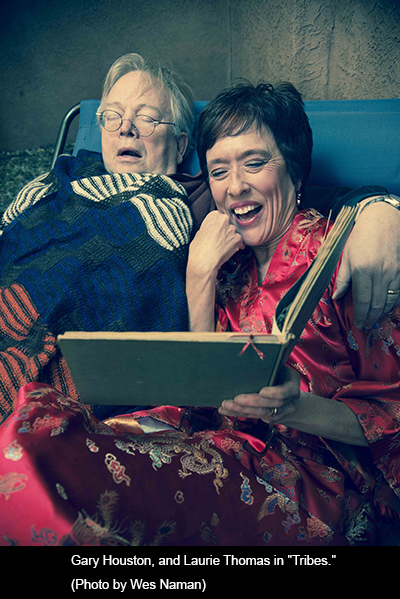
Fusion’s new production of Tribes at Albuquerque’s Cell Theater is all about deafness—not just the inability of some people to hear but the unwillingness of everyone to really listen.
None of the members of the family at the center of this award-winning play by the young British playwright Nina Raine listen to each other, sending a potent message to the audience that our private preoccupations prevent us from ever knowing even those closest to us.
The “tribes” of the title are families, especially one family, but also communities—intellectuals and “hierarchies” of those with varying types of hearing impairment.
This “unconventionally conventional” family is led by Christopher (Gary Houston), a literary critic whose normal speaking voice is a yell, and who, when not yelling, sits at a computer wearing headphones. His wife Beth (Laurie Thomas) is trying to write a novel about a mystery or a family falling apart—she can’t make up her mind—but is blocked. Their daughter Ruth (Kate Mura) is a failed opera singer. One son Daniel (Peter Diseth) is struggling to write a thesis that he doesn’t believe in. The other son Billy, who was born deaf, is trying to find his niche in the world and momentarily becomes a star translator/witness at celebrated trials.
The message that people don’t communicate with each other, don’t really see, hear or feel each other, is imparted in many ways and on many levels.
One of the most poignant moments in this emotionally stirring drama occurs when Billy tells his hearing family they “just didn’t want to hear” him. “This is the first time you’ve listened to me properly, because I’m not speaking.” Billy, who was raised to speak well and lip read brilliantly, has suddenly insisted on using only sign language.
Music plays a big part in this play. A piano that four members of the family know how to play, sits conspicuously but mostly unused in the center of the stage. Between acts and scenes, a variety of opera arias, Janis Joplin songs and classical orchestral pieces blares at the audience, usually at an alarming volume. And of course Ruth tries and fails to become a professional singer.
Again the message is clear: Music, like words, can and often is used more to obfuscate than to communicate.
These characters are all brilliantly articulate but seldom touch each other. Their words hide more than they reveal. After Daniel reacquires a childhood stammer, he embraces his brother Billy for the first time in a searing moment of genuine passion that is intensified by our knowledge of an earlier betrayal.
Directing a play that combines hearing, deaf and partially deaf characters is a complex problem that Jacqueline Reid does a good job of despite occasional stumbles. On one occasion, Billy responds to words from a character standing behind him and whose lips he would be unable two read. Billy speaks in an unselfconscious and fluent way that a person born deaf would be unlikely to attain.
Otherwise though, this is a powerful, moving, skillful and thoroughly professional production, one of the best and most challenging the Fusion company has put on.
The company is spreading its wings a bit further geographically, with dates not only at its home, the Cell, but also at the Wool Warehouse in Albuquerque (where the performance will be signed as well as spoken) and in Santa Fe and Taos. The play opened April 24 and continues through May 11, although some performances are sold out. For reservations and information go to fusionnm.org or call 505-766-9412.



Responses to “‘Tribes’: When no one wants to listen”